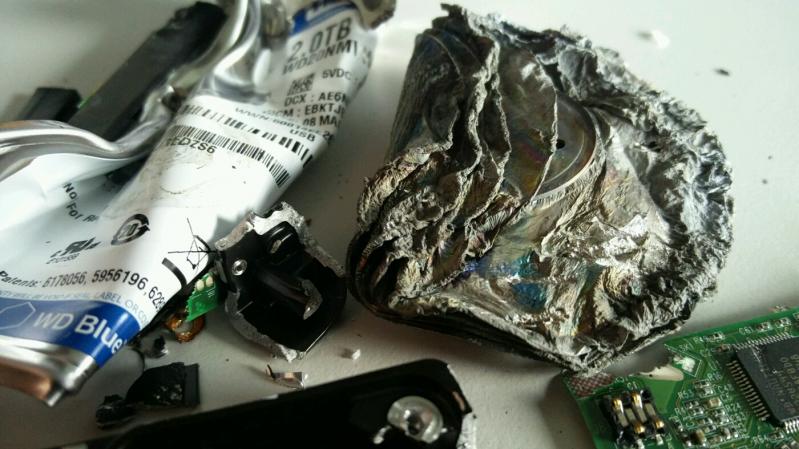Join devRant
Do all the things like
++ or -- rants, post your own rants, comment on others' rants and build your customized dev avatar
Sign Up
Pipeless API

From the creators of devRant, Pipeless lets you power real-time personalized recommendations and activity feeds using a simple API
Learn More
Search - "data destruction"
-
To be a good developer, you must thrive in chaos, and have an insatiable desire to turn it into order.
All user input, both work tasks and actual application input, is pure fucking chaos.
The only way to turn that input into anything usable, is to interpret, structure and categorize it, to describe the rules for transformation as adequately as you can.
Sometimes companies create semi-helpful roles to assist you with this process. Often, these people are so unaware of the delicacy of the existing chaos, that any decision they make just ripples out in waves leaving nearly irreparable confusion and destruction in its path.
So applications themselves also slowly wear down into chaos under pressure of chaotic steak-holders which never seem to be able to choose between peppercorn or bernaise sauce for their steaks.
Features are added, data is migrated between formats, rules become unclear. Is ketchup even fucking valid, as a steak sauce?
The only way to preserve an application long term, is refactoring chaos into order.
But... the ocean of chaos will never end.
You must learn to swim in it.
All you can hope to do is create little pools of clarity where new creative ideas can freely spawn.
Ideas which will no doubt end up polluting their own environment, but that's a problem for tomorrow.
So you must learn to deal with the infinite stream of perplexed reactions from those who can't attach screenshots to issue reports.
You must deflect dragging conversations from those who never quite manage to translate gut feeling into rational sentences.
You must learn to deal with the fact that in reality there are no true microservice backends. There are no clean React frontends. There are no normalized databases. Full test coverage, well-executed retrospectives, finished sprints -- they are all as real as spherical cows in a vacuum.
There is no such thing as clean code.
There is only "relatively cleaner code", and even then there are arguments as to why it would be "subjectively relatively cleaner code".
Every repository, every product, every team and every company is an amalgamation of half-implemented ideals, well-intended tug of war games, and brilliantly shattered dreams.
You will encounter fragmented shards of perfect APIs, miles of tangled barbed documentation, beheaded validator classes, bloody mangled corpses of analytical dashboards, crumbled concrete databases.
You must be able to breathe in those thick toxic clouds of rotting technical and procedural debt, look at your reflection in the locker room mirror while you struggle yourself into a hazmat suit, and think:
"Fuck yes, I was born for this job".24 -
When I worked as an IT student and was asked what we could do to ensure the destruction of data on old drives. I suggested lighting the office on fire while blindly firing guns into the inferno. To this day I don't know why they laughed.3
-
Saturday evening open debate thread to discuss AI.
What would you say the qualitative difference is between
1. An ML model of a full simulation of a human mind taken as a snapshot in time (supposing we could sufficiently simulate a human brain)
2. A human mind where each component (neurons, glial cells, dendrites, etc) are replaced with artificial components that exactly functionally match their organic components.
Number 1 was never strictly human.
Number 2 eventually stops being human physically.
Is number 1 a copy? Suppose the creation of number 1 required the destruction of the original (perhaps to slice up and scan in the data for simulation)? Is this functionally equivalent to number 2?
Maybe number 2 dies so slowly, with the replacement of each individual cell, that the sub networks designed to notice such a change, or feel anxiety over death, simply arent activated.
In the same fashion is a container designed to hold a specific object, the same container, if bit by bit, the container is replaced (the brain), while the contents (the mind) remain essentially unchanged?
This topic came up while debating Google's attempt to covertly advertise its new AI. Oops I mean, the engineering who 'discovered Google's ai may be sentient. Hype!'
Its sentience, however limited by its knowledge of the world through training data, may sit somewhere at the intersection of its latent space (its model data) and any particular instantiation of the model. Meaning, hypothetically, if theres even a bit of truth to this, the model "dies" after every prompt, retaining no state inbetween.16 -
What is everyone's opinion on companies/organisations 'too big to fail'...?
I was just pondering on how 'just Google it' has become so 'natural' as a way of saying search the Internet. The more I think about it, the less I like it.
I know the chances of them failing/crumbling are neary zero (hence the name) but if an org, Ie Alphabet, made some shit decisions and bankrupted their company, what would happen then? Any ideas? I don't mean in terms of social fallout, economic etc.
I mean in terms of network infrastructure, them being such a central part of 'the web', all their Dns services, their backbone links, Google drive, Google fiber etc. What would happen to all user data? Just be destroyed?
I've never 'seen' a large tech company collapse, but just wander as to how that process would work for such a huge organisation, and the literal mountains of data they have which will need destroying or relocating.
Inb4 watch Mr robot hurrr5

